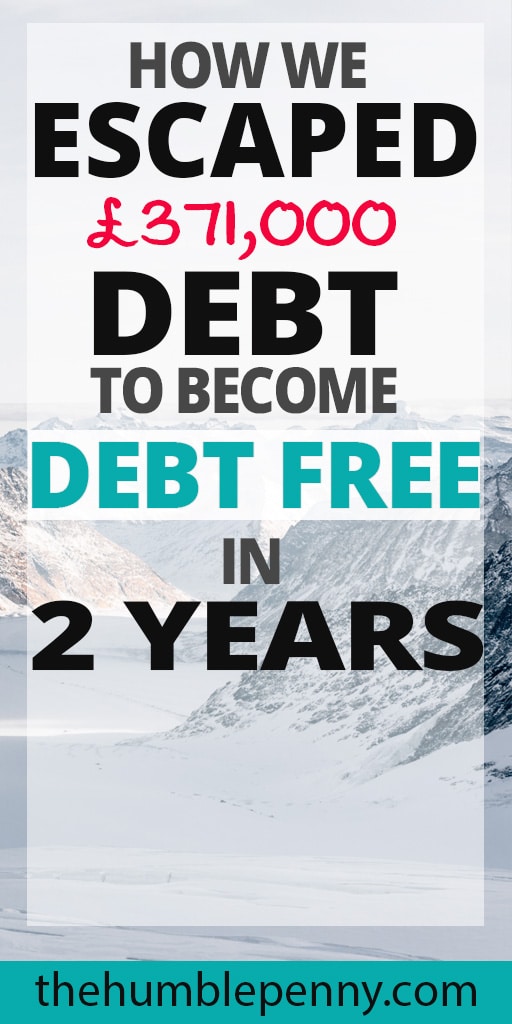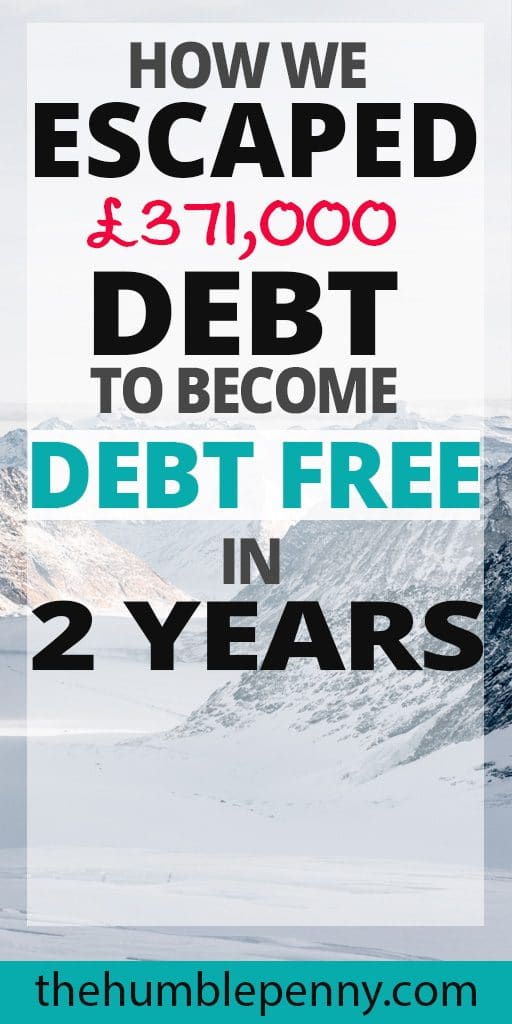How We Escaped £371,000 Debt to Become Debt Free In 2 years
Roanne lives in Birmingham and works as a clothing buyer.
She lives with her husband Laurence who is a trainee barrister.
I recently had the pleasure of staying over with both of them when I was invited to join the Q&A panel for the screening of the ‘Playing With FIRE’ documentary in Birmingham.
The one thing that stuck with me (beyond their generous hospitality), was their debt free journey.
Particularly just how life circumstances can suddenly go from one extreme to another.
I asked Roanne and Lawrence to share their story with our readers and they agreed.
Note:
This story does have a material element of inheritance, which remains highly topical. However, there remains much to be learned from this debt free story.
I’ll now hand over to Roanne and Lawrence to tell their story:
Roanne and Lawrence’s Debt Free Journey
“How my husband and I escaped £371,000 of debt in two years”
The sentence above may look like clickbait – but this was the reality of our situation.
I got married in 2015 and although I had earned good money, I was on a long journey to really discover what sensible financial decisions looked like.
In 2011 I read Rich Dad Poor Dad and decided that property was the way forward to my financial independence.
These seemed to me the most logical income-generating assets.
I already had my own house, but I went on to buy two small flats in Coventry where I lived.
These both required deposits.
My financial journey progressed.
I continued to earn well, but also made some big financial mistakes.
I invested with a large, well-known investment company and paid them extortionate fees.
In another venture, I paid £3k for a three-day FX trading course.
Not totally disastrous in themselves, but underneath these errors was a more insidious issue. I slowly started getting into more and more debt.
Debt can be a slow slide which you hardly notice. Every month, my intention was always to pay off the credit card.
But as payday came round, the demands on the money were greater than my desire to pay off the debt.
When I got married in 2015 I had racked up £31,000 of consumer debt.
This entailed over £1000 minimum payments each month. My husband had no debt.
I thought about trying to get out of debt before I got married, but it just seemed totally unrealistic.
I was ashamed.
When my credit card statement hit the doormat, I used to grab the envelope and not allow my husband anywhere near it.
I was also trapped into having to earn a high salary to service the debt.
Tips To Get Out Of Debt
In the summer of 2016, I finally decided enough was enough. Whatever it took, I wanted to get rid of this debt.
I sat down with my husband and told him the full extent of my debt situation.
He was really shocked when he found out exactly how much debt I was in.
This conversation led us to take some important steps.
We agreed that we would do the following to become debt free:
- Live as simply as possible
- Cut out all unnecessary spending from our lives and bought only essentials.
- Stopped eating out and buying clothes.
- We agreed to no holidays.
- Limited unnecessary travel, even to visit our families.
- Pay the minimum amount on each debt, using any excess funds to pay off the smallest debt first.
Food, work, and sleep are all that we did for 6 months!
The process was not easy, but the peace that I found by just acknowledging the debt and facing up to the full extent of the amount I owed was a powerful moment.
I found a deep inner calm.
Even though the debt was still there, facing up to the truth of the situation set me free to get rid of it.
The first debt was quite small and gone within a month.
Then, the payment that I had been making on the first debt was rolled into defeating the next one.
For me, this was a very useful psychological tool to feel like I was making progress.
There were moments of discouragement along the way.
We were living in a house that was having some renovations done and all these came to a screeching halt when we decided to get out of debt: we were living without carpet, just bare floorboards and lots of dust and dirt!
Sometimes it would have been nice to get some takeaway or go out for a meal, but that was not the priority.
In just seven months we managed to get out of all our consumer debt.
I was starting to sleep better at night and have less anxiety about our finances.
The most interesting part of the process was what getting out of debt actually did for our marriage.
We started to learn to work together as a team on a single goal.
We would sit down at the beginning of every month and make a budget of what we wanted to spend that month, breaking our projected spending down into individual categories.
That wasn’t easy, but once the conversation had been had we felt like we were on the same page.
Sometimes we would argue, but more and more we found we were going in the same direction, working towards a better future for ourselves.
We started to think ‘if we can do this together, then what could our next goal be?’ We began to explore our potential as a couple to work together towards other targets.
So, as I say, after seven months, in January 2017, we could say that we were consumer debt free!
Related post:
10 Tried and Tested Tips To Help You Become Debt Free
Debt Free Living
However, you may remember I described how I had started to buy property.
Although the sense of peace from getting rid of the debt was huge, we still had four mortgages totalling £340,000 of mortgage debt.
Of course, some readers may argue that this is good debt as it is leveraged against an income generating asset.
I am not going to try and dispute that now.
All I want to help you understand is how we came to the decision to get out of the mortgage debt as well.
My husband’s father had died in 2014 and we had been given a house.
The house was fully paid off and the value of the house was enough to be able to pay off all our four mortgages if we sold it.
I am fully aware that inheriting a house is a privilege and not down to our efforts at all.
My husband’s parents’ hard work had given us a valuable asset and we knew that it was our responsibility not to waste the chance to change our lives.
We came to the decision to sell the property in this way.
We asked ourselves some simple questions.
First question:
If we had all the money from this property in the middle of our table in cash would we go out now and buy a detached, difficult-to-rent, bungalow an hour and a half from where we live?
The answer, clearly: No.
Second question:
If we did have that money in cash on the table what would we do with it?
Well, we’d pay off our mortgages of course!
When we said it out loud the course of action seemed simple – and as Dave Ramsey said
‘Pay off your mortgage. If you don’t like it in a few months you can always take it back out again.’
The second part of the equation was that we had spent quite a lot of money on the inherited property.
We had put on a new garage roof and had the roof cleaned and the windows repaired. None of these particularly added value to the property.
Seth Godin usefully talks about the need to ignore sunk costs.
The money that we had spent on the property was gone, we couldn’t get it back. We just had to do the best that we could in the situation as it was.
We have found this method of thinking useful in lots of different areas of our life together.
You can ask the question about any of your assets.
If you had the money in front of you today, would you go and spend it on that particular house, car, business or investment fund?
If not then why not sell that house, car – or whatever – and move on?
How many of us are holding on to individual shares hoping that eventually, they will go back up in value?
What we may need to do is sell them and invest more wisely with the better knowledge that we now have.
We can ask the same question about our jobs.
If we knew what we know now about the job would we have accepted the position?
We tend to hold onto things tightly because of the investment of time, energy and money that we have already sunk in them.
Maybe we just need to accept that, although that seemed the right decision at the time, our knowledge has grown and we need to make new and sometimes painful choices to free ourselves.
If we are in a hole we should stop digging.
If we have made a mistake, we should admit it, not double down on a previous wrong decision.
To conclude:
By the Summer of 2018, we were completely debt free.
The feeling of owing nobody any money is highly recommended.
It meant I didn’t have to stay in a job I didn’t like.
We could live (modestly) from our rental income.
Our savings rate went through the roof because when you don’t owe anyone any money you can keep, or give, or spend what you earn.
At last, we have started paying for our present and future instead of my past.
What to Read Next>>
- How We Paid Off Our Mortgage Early and Why You Should
- 5 Debt Realities and What To Do About Them
- 7 Habits For A Successful Debt Free Journey
What to Watch Next>>


